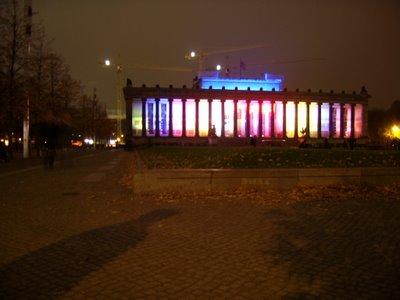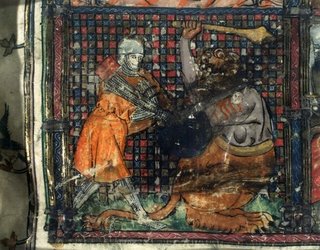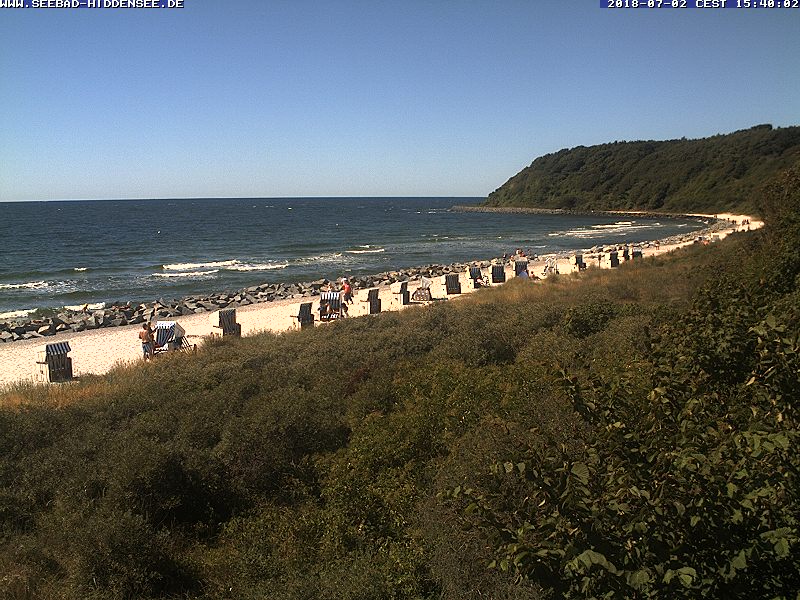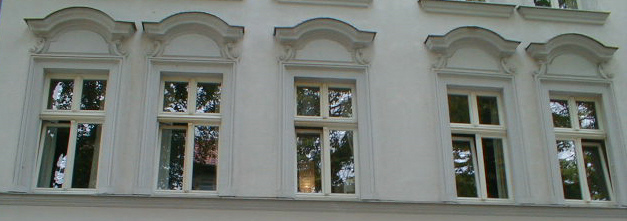Monday, October 30, 2006
Sunday, October 29, 2006
No Country Should Be Ruled by Faith
The New York Review of Books: A Country Ruled by Faith
By Garry Wills
"The right wing in America likes to think that the United States government was, at its inception, highly religious, specifically highly Christian, and even more specifically highly biblical. That was not true of that government or any later government—until 2000, when the fiction of the past became the reality of the present."
Read the whole article!
In Berlin, two Members of Parliament, Ekin Deligöz (Grüne) and Lale Akgün (SPD), both women themselves of Turkish origin, have called on all women of Islamic faith to take off their veils, considering them only a sign of Islamic fundamentalist repression of women. They call on female Muslims to discard them OF THEIR OWN FREE WILL, reminding them they do nothing for an integrative, integrated society, but instead merely increase animosities.
The result for the two has included death threats. The Green representative had to be place under police protection, and now many other German politicians are calling for respect for their right to free expression of their opinions.
I would like to add an appeal for the faithful of ALL RELIGIONS to cease wearing any symbols of their belief in public, remove the crosses, the crucifixes, the clerical collars, the nun's veils, the hairshirts, the dreadlocks, the yamulkahs, ALL MANIFESTATIONS of RELIGION should be kept in private.
Best, everyone would confront and speak with each other as HUMANS THINKING and not as potential objects for missionary work and conversion through blatant symbols.
STOP WEARING RELIGIOUS SYMBOLS - EVERYONE - EVERYWHERE - ALWAYS !!
Saturday, October 28, 2006
What is a no-brainer?
Scott Hennen, WDAY: Would you agree a dunk in water is a no-brainer if it can save lives?
THE VICE PRESIDENT: It's a no-brainer for me, but for a while there, I was criticized as being the Vice President "for torture." We don't torture. That's not what we're involved in. We live up to our obligations in international treaties that we're party to and so forth. But the fact is, you can have a fairly robust interrogation program without torture, and we need to be able to do that. And thanks to the leadership of the President now, and the action of the Congress, we have that authority, and we are able to continue to program.
Source: Office of the Vice President, October 24, 2006
Next question, from me:
Would you agree the chained up current holder of the office of the Vice Presidency of the United States is a no-brainer?
Answer:
If that means someone without a brain (in the sense of something one employs to THINK), then the answer is an unequivocal YES.
Here's for some waterboards for Chainy and his entire chaingang!
Friday, October 27, 2006
Saturday, October 21, 2006
Friday, October 20, 2006
Le journal de Trêve
Here, an excellent opportunity to make the acquaintance of a different writer, unfortunately already dead, and his exquisite NEW written work just published by Gallimard, in the Collecton L'INFINI, under the auspices of Philippe Sollers.
JOURNAL DE TRÊVE de Frédéric Berthet. Edition établie par Norbert Cassegrain, Gallimard, "L'Infini", 640 p., 25 €.
A brief extract from the review which is to be found in full under the link above:
On rêverait de convaincre les lecteurs de romans bien ficelés que ce livre en fragments est plus important que tous ceux qui vont recevoir bientôt des prix littéraires. Et qu'il est passionnant d'entrer, avec Berthet, dans une oeuvre majeure en construction, avec des allers et retours, des listes de chapitres, des plans parfois contradictoires, des échappées, des repentirs, des scènes isolées dont on ignore encore la place dans la narration finale, des interrogations sur ce que doit être le livre à venir, le temps qui convient au récit, les pronoms, l'éventuelle "valeur humoristique de l'adverbe"...
Wednesday, October 18, 2006
Bushbaby Signs Un-American Military Commissions Act - Undermines Due Process and the Rule of Law
American Civil Liberties Union : President Bush Signs Un-American Military Commissions Act, ACLU Says New Law Undermines Due Process and the Rule of Law:
The following is attributed to Anthony D. Romero, ACLU Executive Director:
"With his signature, President Bush enacts a law that is both unconstitutional and un-American. This president will be remembered as the one who undercut the hallmark of habeas in the name of the war on terror. Nothing separates America more from our enemies than our commitment to fairness and the rule of law, but the bill signed today is an historic break because it turns Guantánamo Bay and other U.S. facilities into legal no-man's-lands.
"The president can now - with the approval of Congress - indefinitely hold people without charge, take away protections against horrific abuse, put people on trial based on hearsay evidence, authorize trials that can sentence people to death based on testimony literally beaten out of witnesses, and slam shut the courthouse door for habeas petitions. Nothing could be further from the American values we all hold in our hearts than the Military Commissions Act."
Wiedereröffnung des Bode-Museums in Berlin Reopening
Adding a crown jewel to Berlin's exquisite Museumsinsel, the Bode Museum reopened yesterday after long years of restoration and renovation. Here a link to the reports on the opening on German "cultural" tv-channel 3sat.
This link is to a virtual tour of the entire complex (with German commentary) in flash and with 360° panorama pictures.
It is well worth while, as this image of the grand dome with the equestrian statue may help to indicate.
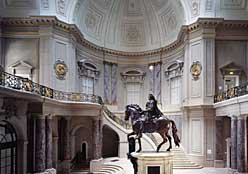
To spend time on the island, at the colonnade to the Alte Nationalgalerie for example to read and write, is always envigorating, enlightening, encouraging. Now, with the (re)addition of this spacious museum with sculptures and paintings grouped together by period and theme, Berlin can offer yet more luxuriant spots to BE in the very heart of the city.
Take a look - and visit in person when in Berlin.
9 Paradoxes of a Lost War
TomDispatch describes more playpen confusion and the paradoxes Michael Schwarz demonstrates in a war written and directed by a bushbaby: "The More Force You Use, the Less Effective You Are".
--- well worth clicking to read in full
Thursday, October 12, 2006
Nobel Prize for Literature - an excellent choice
Congratulations to Orhan Pamuk on winning, and much more on standing up for the right to speak out and write on what must be said and written, whatever a state or a religion may do to repress those thoughts.
And praise for the Nobel Committee for making such a point with this choice. The Enlightenment lives from free and fearless literature.
SVENSKA AKADEMIEN
Press Release
12 October 2006
The Nobel Prize in Literature 2006
Orhan Pamuk
The Nobel Prize in Literature for 2006 is awarded to the Turkish writer Orhan Pamuk
"who in the quest for the melancholic soul of his native city has discovered new symbols for the clash and interlacing of cultures".
The Permanent Secretary
Biobibliographical notes
Orhan Pamuk was born 7 June 1952 in Istanbul into a prosperous, secular middle-class family. His father was an engineer as were his paternal uncle and grandfather. It was this grandfather who founded the family’s fortune. Growing up, Pamuk was set on becoming a painter. He graduated from Robert College then studied architecture at Istanbul Technical University and journalism at Istanbul University. He spent the years 1985-1988 in the United States where he was a visiting researcher at Columbia University in New York and for a short period attached to the University of Iowa. He lives in Istanbul.
Pamuk has said that growing up, he experienced a shift from a traditional Ottoman family environment to a more Western-oriented lifestyle. He wrote about this in his first published novel, a family chronicle entitled Cevdet Bey Ve Oğulları (1982), which in the spirit of Thomas Mann follows the development of a family over three generations.
His second novel, Sessiz Ev (1983; The House of Silence, 1998), uses five different narrator perspectives to describe a situation in which several family members visit their ageing grandmother at a popular seaside resort with Turkey teetering on the brink of civil war. The period is 1980. The grandchildren’s political discussions and their friendships reflect a social chaos where various extremist organisations vie for power.
Pamuk’s international breakthrough came with his third novel, Beyaz Kale (1985; The White Castle, 1992). It is structured as an historical novel set in 17th-century Istanbul, but its content is primarily a story about how our ego builds on stories and fictions of different sorts. Personality is shown to be a variable construction. The story’s main character, a Venetian sold as a slave to the young scholar Hodja, finds in Hodja his own reflection. As the two men recount their life stories to each other, there occurs an exchange of identities. It is perhaps, on a symbolic level, the European novel captured then allied with an alien culture.
Pamuk’s writing has become known for its play with identities and doubles. The issue appears in his novel Kara Kitap (1990; The Black Book, 1995) in which the protagonist searches the hubbub of Istanbul for his vanished wife and her half-brother, with whom he later exchanges identities. Frequent references to the mystic tradition of the East make it natural to see this in a Sufi perspective. Kara Kitap represented a definite break with the governing social realism in Turkish literature. It provoked debate in Turkey not least through its Sufism references. Pamuk based his screenplay for the film Gizli Yüz (1992) on the novel.
Yeni Hayat (1994; The New Life, 1996) is a novel about a secret book with the capacity to irrevocably change the life of any person who reads it. The search for the book provides the structure of a physical journey but bordered by literary references, thought experiments in the spirit of mysticism, and reminiscences of older Turkish popular culture, turning the plot into an allegoric course of events correlated with the Romantic myth of an original, lost wisdom.
According to the author, the major theme of Benim Adim Kırmızı (2000; My Name is Red, 2002) is the relationship between East and West, describing the different views on the artist’s
relation to his work in both cultures. It is a story about classical miniature painting and simultaneously a murder mystery in a period environment, a bitter-sweet love story, and a subtle dialectic discussion of the role of individuality in art.
Pamuk has published a collection of essays, Öteki Renkler : Seçme Yazılar Ve Bir Hikâye (1999), and a city portrait, İstanbul : Hatıralar Ve Şehir (2003; Istanbul : Memories and the City, 2006). The latter interweaves recollections of the writer’s upbringing with a portrayal of Istanbul’s literary and cultural history. A key word is hüzün, a multi-faceted concept Pamuk uses to characterise the melancholy he sees as distinctive for Istanbul and its inhabitants.
Pamuk’s latest novel is Kar (2002; Snow, 2005). The story is set in the 1990s near Turkey’s eastern border in the town of Kars, once a border city between the Ottoman and Russian empires. The protagonist, a writer who has been living in exile in Frankfurt, travels to Kars to discover himself and his country. The novel becomes a tale of love and poetic creativity just as it knowledgeably describes the political and religious conflicts that characterise Turkish society of our day.
In his home country, Pamuk has a reputation as a social commentator even though he sees himself as principally a fiction writer with no political agenda. He was the first author in the Muslim world to publicly condemn the fatwa against Salman Rushdie. He took a stand for his Turkish colleague Yaşar Kemal when Kemal was put on trial in 1995. Pamuk himself was charged after having mentioned, in a Swiss newspaper, that 30.000 Kurds and one million Armenians were killed in Turkey. The charge aroused widespread international protest. It has subsequently been dropped.
Literary Prizes and Awards: Milliyet Roman Yarışması Ödülü (1979, shared with Mehmet Eroğlu), Orhan Kemal Roman Ödülü (1983), Madaralı roman Ödülü (1984), the Independent Award for Foreign Fiction (1990), Prix de la Découverte Européenne (1991), Prix France Culture (1995), Prix du Meilleur Livre Étranger (2002), Premio Grinzane Cavour (2002), the IMPAC Dublin Award (2003), Ricarda-Huch-Preis (2005), Der Friedenspreis des Deutschen Buchhandels (2005), Prix Médicis étranger (2005), Prix Méditerranée Étranger (2006).
Works in Turkish
Cevdet Bey Ve Oğulları. – İstanbul : Karacan Yayınları, 1982
Sessiz Ev. – İstanbul : Can Yayınları, 1983
Beyaz Kale. – İstanbul : Can Yayınları, 1985
Kara Kitap. – İstanbul : Can Yayınları, 1990
Gizli Yüz : Senaryo. – İstanbul : Can Yayınları, 1992
Yeni Hayat. – İstanbul : İletişim, 1994
Benim Adım Kırmızı. – İstanbul : İletişim, 1998
Öteki Renkler : Seçme Yazılar Ve Bir Hikâye. – İstanbul : İletişim, 1999
Kar. – İstanbul : İletişim, 2002
İstanbul : Hatıralar Ve Şehir. – İstanbul : Yapı Kredi Kültür Sanat Yayıncılık, 2003
Works in English
The White Castle / translated from the Turkish by Victoria Holbrook. – New York : Braziller, 1991. – Translation of Beyaz Kale
The Black Book / translated by: Güneli Gün. – New York : Farrar, Straus, 1994. – Translation of Kara Kitap
The New Life / translated by Güneli Gün. – New York : Farrar, Straus, and Giroux, 1997. – Translation of Yeni Hayat
My Name is Red / translated from the Turkish by Erdağ M. Göknar. – New York : Knopf, 2001. – Translation of Benim Adım Kırmızı
Snow / translated from the Turkish by Maureen Freely. – New York : Knopf, 2004. – Translation of Kar
Istanbul : Memories and the City / translated from the Turkish by Maureen Freely. – New York : Knopf, 2005. – Translation of İstanbul : Hatıralar Ve Şehir
Works in French
La maison du silence / trad. du turc par Münevver Andaç. – Paris : Gallimard, 1988. – Traduction de: Sessiz Ev
Le livre noir / trad. du turc par Münevver Andaç. – Paris : Gallimard, 1994. – Traduction de: Kara Kitap
Le château blanc / trad. du turc par Münevver Andaç. – Paris : Gallimard, 1996. – Traduction de: Beyaz Kale
La vie nouvelle / trad. du turc par Münevver Andaç. – Paris : Gallimard, 1998. – Traduction de: Yeni Hayat
Mon nom est Rouge / trad. du turc par Gilles Authier. – Paris : Gallimard, 2001. – Traduction de: Benim Adım Kırmızı
Neige / traduit du turc par Jean-François Pérouse. – Paris : Gallimard, 2005. – Traduction de: Kar
Works in German
Die weisse Festung / Aus dem Türk. übertr. von Ingrid Iren. – Frankfurt am Main : Insel, 1990. – Originaltitel: Beyaz Kale
Das schwarze Buch / Aus dem Türk. von Ingrid Iren. – München : Hanser, 1995. – Originaltitel: Kara Kitap
Das neue Leben / Aus dem Türk. von Ingrid Iren. – München : Hanser, 1998. – Originaltitel: Yeni Hayat
Rot ist mein Name / Aus dem Türk. von Ingrid Iren. – München : Hanser, 2001. – Originaltitel: Benim Adım Kırmızı
Schnee / Aus dem Türk. von Christoph K. Neumann. – München : Hanser, 2005. – Originaltitel: Kar
Der Blick aus meinem Fenster : Betrachtungen. – München : Hanser, 2006
Saturday, October 7, 2006
Home Again - and Berlin's doing just fine
So, refreshed back in the cozy site of our life in Weißensee in Berlin, we've collected our parrot and unpacked our bags, e-mailed some friends and family, chatted with others on the phone, and are enjoying a nice sunny autumn afternoon before all work begins again on Monday.
Three images from Scotland to start with, just for record-keeping,
one from Edinburgh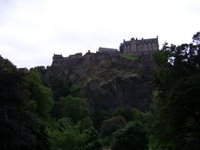
and two from the incredible Island of Arran.

Of course, much more is happening in the world, and here's a link to some sound thinking on the formation of a Palestinian government of unity being hindered by playpen policy:
LE MONDE 07.10.06
La conjonction de ces trois facteurs - les tergiversations d'Ismaïl Haniyeh, la maladresse de Mahmoud Abbas et enfin l'intransigeance américaine, qui ne veut toujours pas d'un gouvernement dirigé par Ismaïl Haniyeh, même s'il est constitué de membres du Fatah et de technocrates après que Washington eut plaidé pour des élections démocratiques en Palestine, ce qui a été le cas - a achevé de ruiner les chances de constitution d'un gouvernement d'union nationale.©
--------------------------------------------------
What follows from The New York Times is extremely funny and the entire article a great read on the absurdity of the "more secure playpenned world" we are now all living in. I will quote only one paragraph and provide the link to the full article.
Security Barriers of New York Are Removed
By CARA BUCKLEY
[3rd paragraph] Officials found that the barriers obstructed pedestrian flow — and, in the case of planters, often ended up being used as giant ashtrays. Counterterrorism experts also concluded that in terms of safety, some of the barriers, which building owners put in of their own accord, might do more harm than good.
Take a look around in Berlin at some of the streets that we have lost for the creation of the bushbaby's safer world!
-------------------
And finally for today, a recommendation for a really good cinema experience. Now I know why I never wanted to be queen or be anywhere near royalty! You have to go see it; Frears is ingenious and the actress Helen Mirren incredible!
The Queen, a film by Stephen Frears
Tuesday, October 3, 2006
Washington Post from today:
Tenet Recalled Warning Rice
Former CIA Chief Told 9/11 Commission of Disputed Meeting
By Dan Eggen and Robin WrightWashington Post Staff WritersTuesday, October 3, 2006; A03
Former CIA director George Tenet told the 9/11 Commission that he had warned of an imminent threat from al-Qaeda in a July 2001 meeting with Condoleezza Rice, adding that he believed Rice took the warning seriously, according to a transcript of the interview and the recollection of a commissioner who was there.
Tenet's statements to the commission in January 2004 confirm the outlines of an event in a new book by Washington Post Assistant Managing Editor Bob Woodward that has been disputed by some Bush administration officials. But the testimony also is at odds with Woodward's depiction of Tenet and former CIA counterterrorism chief J. Cofer Black as being frustrated that "they were not getting through to Rice" after the July 10, 2001, meeting.
Rice angrily rejected those assertions yesterday, saying that it was "incomprehensible" that she would have ignored such explicit intelligence from senior CIA officials and that she received no warning at the meeting of an attack within the United States.
Rice acknowledged that the White House was receiving a "steady stream of quite alarmist reports of potential attacks" during that period, but said the targets were assumed to be in the Middle East,
including Saudi Arabia, Yemen, Israel and Jordan.
"What I am quite certain of, however, is that I would remember if I was told -- as this account apparently says -- that there was about to be an attack in the United States," Rice said. "The idea that I would somehow have ignored that I find incomprehensible."
The meeting has become the focus of a fierce and often confusing round of finger-pointing involving Rice, the White House and the 9/11 Commission, all of whom dispatched staffers to the National Archives and other locations yesterday in attempts to sort out what had occurred.
After a week of Arran..
Now back in Edinburgh and off to the Lyceum this evening for their new production of Shakespeare's Merchant of Venice.
Noticed that in Germany nothing's changed> cdu pols are claiming not to be distancing themselves from Buttons Angie, which of course means they are or wouldn't need to deny it.
In Berlin there's still no new coalition for the city-state. SPD playing hardball with both potential partners of equal strenght (weakened PDS and strengthened Gruene).
The bushbaby and cunilingus are still claiming they didn't know anything was coming before 9/11 and therefore were so immediately prepared to start so many military interventions.
And this is nice place to be.
There is no void like the void in the head's of people who claim that voids are nihilistic!
Herzog by Bellow is great.
Even Bret Easton Ellis hit the mark with Lunar Park.
It's possible to have a full heart and a full mind and an incredibly sensually fulfilling erotic life all at the same time.
That's what Herzog was trying to learn and what Bret EE admits he couldn't and what I experience with the utmost joy everyday.
Refer to my verbal mood (conjugatable only in present and future tenses) "Voluptarium".
The voluptuous will inherit the earth, because they're the only ones glad to be on it!
That's a revolution!
